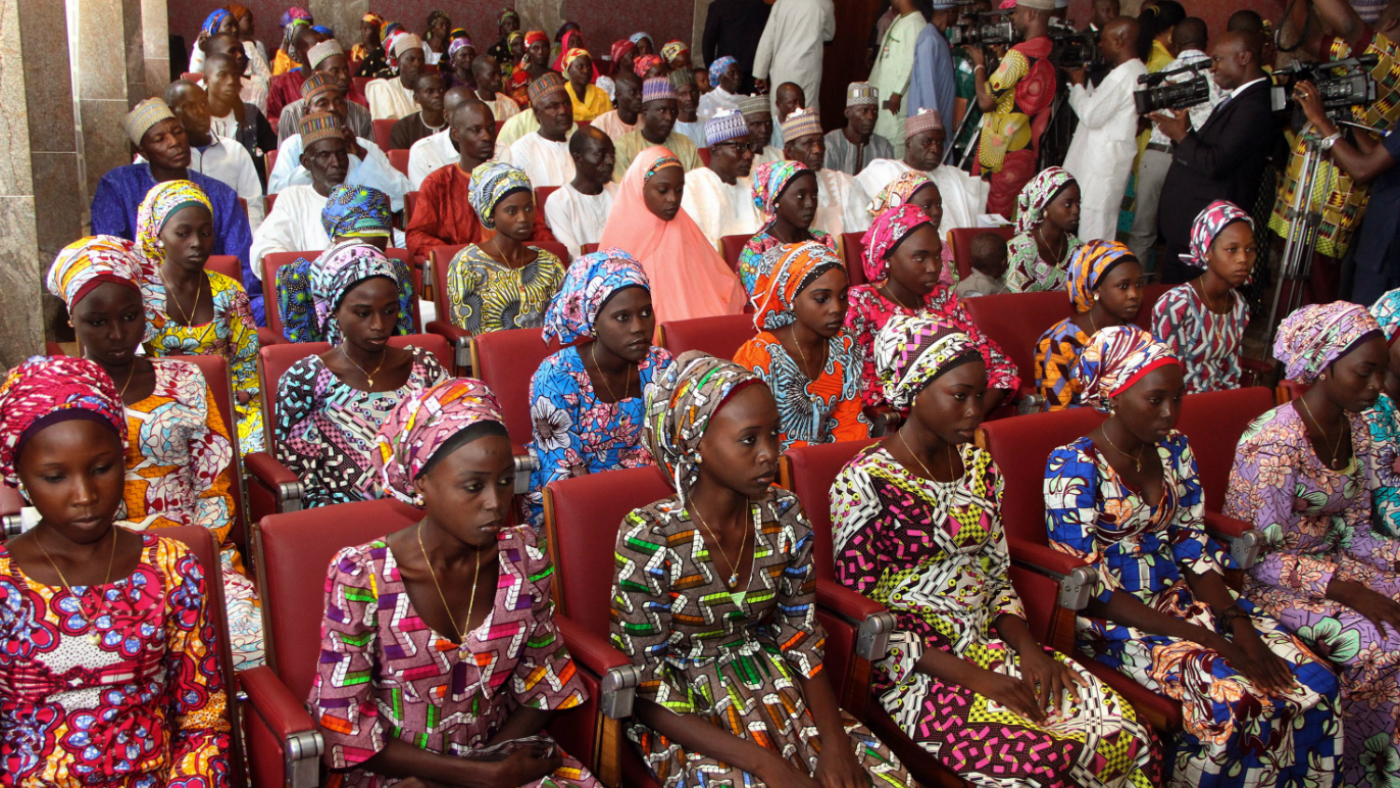82 Chibok schoolgirls freed in exchange for five Boko Haram leaders
Kidnapped girls released after 'lengthy negotiations' between Nigerian government and radical Islamist group

A free daily email with the biggest news stories of the day – and the best features from TheWeek.com
You are now subscribed
Your newsletter sign-up was successful
More than 80 schoolgirls kidnapped by Boko Haram three years ago have arrived in Nigeria's capital as part of a government prisoner exchange.
After what has been described as "lengthy negotiations" by President Muhammadu Buhari, a further 82 of the 270 girls kidnapped from the northern town of Chibok in 2014 have been reunited with their families in exchange for five Boko Haram commanders. It follows the release of 21 schoolgirls last October, although the government then denied it had made a prisoner exchange or paid a ransom.
Ahmed Idris of Al Jazeera said: "A lot of people are happy. A lot of people are excited. But there is also anxiety... Everybody hopes that his or her daughter is part of the 82 who've come home now."
The Week
Escape your echo chamber. Get the facts behind the news, plus analysis from multiple perspectives.

Sign up for The Week's Free Newsletters
From our morning news briefing to a weekly Good News Newsletter, get the best of The Week delivered directly to your inbox.
From our morning news briefing to a weekly Good News Newsletter, get the best of The Week delivered directly to your inbox.
Boko Haram, the seven-year insurgency which seeks to create an Islamic caliphate in the north-east of Nigeria, has claimed the lives of an estimated 15,000 people and displaced more than two million.
Its kidnapping of the girls made headlines around the world.
A global Bring Back Our Girls campaign, supported by former US first lady Michelle Obama and other celebrities, has brought "tremendous pressure" on the Nigerian government to counter the extremist group, which controls large parts of the north of the country, says The Guardian.
Of the initial group abducted, 113 are still unaccounted for. Reports from survivors and defectors suggest many have been forced to marry their captors and give birth to their children, while others were strapped with explosives and used as suicide bombers.
A free daily email with the biggest news stories of the day – and the best features from TheWeek.com
Aisha Yesufu, of Bring Back Our Girls, said the freed girls required rehabilitation and trauma counselling.
"It's not just to bring them back home; we must ensure they get the education they are supposed to have," she said.
"It is time for them to be reunited with their families... There has to be rehabilitation. And at the end of the day, we want to have world leaders out of every one of them so they can be what the terrorists did not want them to be."
-
 What are the best investments for beginners?
What are the best investments for beginners?The Explainer Stocks and ETFs and bonds, oh my
-
 What to know before filing your own taxes for the first time
What to know before filing your own taxes for the first timethe explainer Tackle this financial milestone with confidence
-
 The biggest box office flops of the 21st century
The biggest box office flops of the 21st centuryin depth Unnecessary remakes and turgid, expensive CGI-fests highlight this list of these most notorious box-office losers
-
 Epstein files topple law CEO, roil UK government
Epstein files topple law CEO, roil UK governmentSpeed Read Peter Mandelson, Britain’s former ambassador to the US, is caught up in the scandal
-
 Iran and US prepare to meet after skirmishes
Iran and US prepare to meet after skirmishesSpeed Read The incident comes amid heightened tensions in the Middle East
-
 Israel retrieves final hostage’s body from Gaza
Israel retrieves final hostage’s body from GazaSpeed Read The 24-year-old police officer was killed during the initial Hamas attack
-
 China’s Xi targets top general in growing purge
China’s Xi targets top general in growing purgeSpeed Read Zhang Youxia is being investigated over ‘grave violations’ of the law
-
 Panama and Canada are negotiating over a crucial copper mine
Panama and Canada are negotiating over a crucial copper mineIn the Spotlight Panama is set to make a final decision on the mine this summer
-
 Why Greenland’s natural resources are nearly impossible to mine
Why Greenland’s natural resources are nearly impossible to mineThe Explainer The country’s natural landscape makes the task extremely difficult
-
 Iran cuts internet as protests escalate
Iran cuts internet as protests escalateSpeed Reada Government buildings across the country have been set on fire
-
 US nabs ‘shadow’ tanker claimed by Russia
US nabs ‘shadow’ tanker claimed by RussiaSpeed Read The ship was one of two vessels seized by the US military